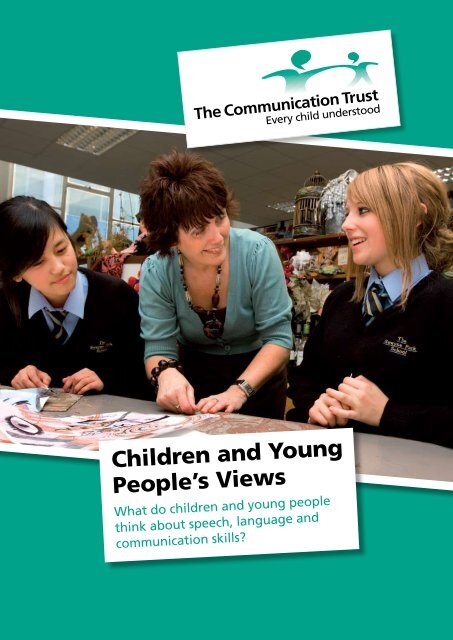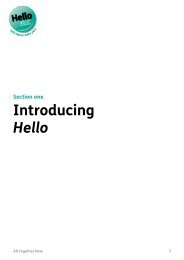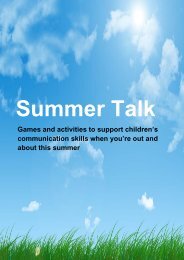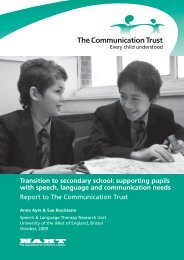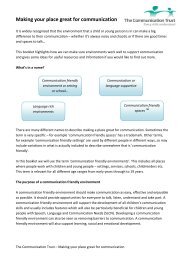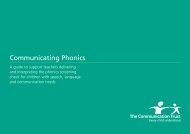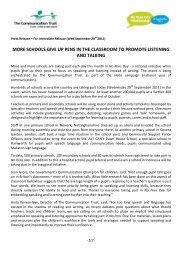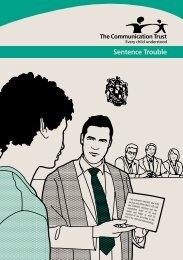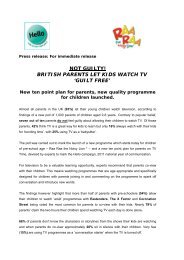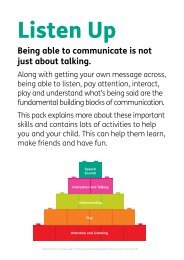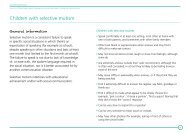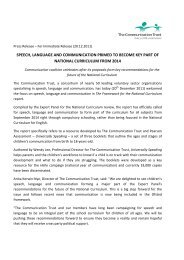What do children and young people think about speech ... - Afasic
What do children and young people think about speech ... - Afasic
What do children and young people think about speech ... - Afasic
- No tags were found...
You also want an ePaper? Increase the reach of your titles
YUMPU automatically turns print PDFs into web optimized ePapers that Google loves.
Children <strong>and</strong> YoungPeople’s Views<strong>What</strong> <strong>do</strong> <strong>children</strong> <strong>and</strong> <strong>young</strong> <strong>people</strong><strong>think</strong> <strong>about</strong> <strong>speech</strong>, language <strong>and</strong>communication skills?
<strong>What</strong> <strong>do</strong> <strong>children</strong><strong>and</strong> <strong>young</strong> <strong>people</strong><strong>think</strong> <strong>about</strong> <strong>speech</strong>,language <strong>and</strong>communicationskills?The Communication Trust supportsthe <strong>children</strong>’s workforce in developingskills relating to <strong>speech</strong>, language <strong>and</strong>communication development in <strong>children</strong>.The Trust wants everyone workingwith <strong>children</strong> <strong>and</strong> <strong>young</strong> <strong>people</strong> to beable to encourage good language <strong>and</strong>communication skills <strong>and</strong> to spot anyonewho is struggling.So... we want to find out what <strong>young</strong><strong>people</strong> <strong>think</strong>.We asked <strong>young</strong> <strong>people</strong>…• Are communication skills important?• Do communication skills need to be taught– or <strong>do</strong> they just happen anyway?• Do teachers have a role in teaching theseskills?• <strong>What</strong> can teachers <strong>do</strong> to support yourcommunication skills?• <strong>What</strong> are your top communication tips forteachers?Who did we talk to?• We talked to <strong>young</strong> <strong>people</strong> in groups<strong>and</strong> by themselves, some were pupils inmainstream schools, others in a specialschool, others were in social groups.• About 70 <strong>young</strong> <strong>people</strong> told us what theythought.• They were aged between 11 <strong>and</strong> 23.• Eight of these <strong>young</strong> <strong>people</strong> hadcommunication difficulties.• All were still in education; mainly school orcollege <strong>and</strong> a couple at university.
<strong>What</strong> did we <strong>do</strong>?• We explained to the <strong>young</strong> <strong>people</strong> why wewanted to talk to them.• We took notes <strong>and</strong> tape recorded some ofthe sessions.• We checked with the <strong>young</strong> <strong>people</strong> that weunderstood what they were telling us.• We told them we would write a report, buttheir names, or other <strong>people</strong>’s names theymentioned wouldn’t be included.• They were encouraged to discuss thequestions <strong>and</strong> ask <strong>about</strong> anything they wereunsure of.<strong>What</strong> did we <strong>do</strong> with all theinformation?• We looked at all the information <strong>and</strong> picke<strong>do</strong>ut ideas that were similar in the differentgroups <strong>and</strong> interviews.• We then went back through the information<strong>and</strong> found things <strong>young</strong> <strong>people</strong> had saidwhich supported those ideas.• We then put that information in this report,so you will see:- the questions we asked- the ideas <strong>young</strong> <strong>people</strong> talked <strong>about</strong>- examples of what the <strong>young</strong> <strong>people</strong> said“Good communication is oneof the most important skillsanyone could have..”“When you have a teacherwho makes you feelvalued, who always listens<strong>and</strong> encourages you, it’sincredible.”Children <strong>and</strong> Young People’s Consultation 2009 3
<strong>What</strong> did the <strong>young</strong><strong>people</strong> tell us?To make sure we were all talking <strong>about</strong>the same thing, we started off with aquestion <strong>about</strong> communication skills...We asked… <strong>What</strong> <strong>do</strong> we meanby communication skills?They talked <strong>about</strong> speaking, listening,underst<strong>and</strong>ing <strong>and</strong> taking turns. A couple of<strong>young</strong> <strong>people</strong> said you have to know howto talk to different <strong>people</strong> in different ways,especially in secondary school <strong>and</strong> that thereare different rules, phrases <strong>and</strong> words used insecondary.“You have to be able to expressyourself well. But you have tobalance this with the ability tolisten <strong>and</strong> try <strong>and</strong> underst<strong>and</strong> theideas of other <strong>people</strong>..”“You need to know when <strong>and</strong>how to listen – loads of <strong>people</strong>just <strong>do</strong>n’t.”“Children should always beencouraged to talk, to write, toforge bonds with other <strong>people</strong>:that is how we grow.”4 Children <strong>and</strong> Young People’s Consultation 2009
We asked… <strong>What</strong> <strong>do</strong> you <strong>think</strong><strong>about</strong> communication skills? Doyou <strong>think</strong> they are important?All the <strong>young</strong> <strong>people</strong> we spoke to said that it isreally important to have good communicationskills. They said they often take these skills forgranted <strong>and</strong> felt most of the <strong>people</strong> aroundthem did the same. Many of the <strong>young</strong> <strong>people</strong>described situations when communication hadbroken <strong>do</strong>wn, with friends, family or teachers.They went on to say why they thought theywere important.They said communication skills wereimportant for living:“Good communication is one of the mostimportant skills anyone could have..”“Oh my God, it just affects everything.”For growing:“Children should always be encouraged totalk, to write, to forge bonds with other<strong>people</strong>: that is how we grow.”For <strong>do</strong>ing well in life:“We need communication skills to get jobs,interviews, for later life.”For emotional / social reasons:“If you have good communication skills,socially it gives you more confidence.”“With the best teachers, thelesson revolves around thediscussion.”For getting things <strong>do</strong>ne or gettingwhat you need:“You need to be able to communicate toget what you want... in a good way.”“We need communication skills to controlthings <strong>and</strong> get things <strong>do</strong>ne.”“You need to be able to say your ideas ornothing will get changed.”There was also a lot of discussion <strong>about</strong> how<strong>people</strong> make judgements based on how youtalk; they felt adults judge <strong>young</strong> <strong>people</strong>because of words or phrases they use, <strong>and</strong><strong>young</strong> <strong>people</strong> judge each other for the samekinds of reasons. Some of the <strong>young</strong> <strong>people</strong>said that could be difficult:“First impressions... you’re judged on howyou talk <strong>and</strong> how you interact.”“In high school everything is different,conversations are deeper, less trivial, moremature; attitudes are different, there’s justa different way of talking <strong>and</strong> looking atthings... You have to swear more <strong>and</strong> getto know new words <strong>and</strong> phrases.”They talked <strong>about</strong> how frustratingit is when you can’t make othersunderst<strong>and</strong> what you have to say:“It’s frustrating if you can’t interact <strong>and</strong>get your message across in the way youwant to.““If you can’t express your views then you<strong>do</strong>n’t get listened to.”“If you have difficulties you might bejudged as being not very intelligent.”“You need to be able to sayyour ideas or nothing will getchanged.”Children <strong>and</strong> Young People’s Consultation 2009 5
We asked… <strong>What</strong> can adults <strong>do</strong>to support communication?We asked <strong>young</strong> <strong>people</strong> to <strong>think</strong> mainly oftheir experiences <strong>and</strong> examples in schools. Theytalked a lot <strong>about</strong> how adults should speakto students – for all <strong>young</strong> <strong>people</strong> we spoketo, that meant not too much teacher talk,explaining information clearly <strong>and</strong> giving pupilstime to respond. All of this was really importantto <strong>young</strong> <strong>people</strong> with <strong>speech</strong>, language <strong>and</strong>communication needs (SLCN) too.“Give pupils a chance to answer orcomment. Wait – maybe even 5 minutes,<strong>do</strong>n’t interrupt until we’re ready, nod <strong>and</strong>give eye contact”They talked a lot <strong>about</strong> adults listening tostudents <strong>and</strong> having lessons which were fun,engaging <strong>and</strong> allowed students to practise theircommunication skills. They said they all learntmore in lessons where they can <strong>do</strong> practicalactivities.“Teach us how to debate <strong>and</strong> havediscussions in every lesson – let us practisethe skills, you get better if you practise”They thought teachers need to know who theirstudents are <strong>and</strong> underst<strong>and</strong> what helps them.For pupils with SLCN, this meant:“Teachers need to underst<strong>and</strong> pupils <strong>and</strong>what helps them”For other students it was simpler:“Spend time getting to know pupils –remember their names”We really wanted to find out from <strong>young</strong><strong>people</strong> what made a difference to them, to<strong>think</strong> a bit more <strong>about</strong> what teachers can <strong>do</strong> tosupport communication in <strong>young</strong> <strong>people</strong>, so…We asked... Think of a teacheryou know who is really good atcommunicating with students,someone who is good atencouraging you to use yourown communication skills. <strong>What</strong><strong>do</strong> they <strong>do</strong> that works?They thought it was important for teachers tomake sure everyone is involved in the lesson,give clear information, encourage groupdiscussion <strong>and</strong> not talk too much.“With the best teachers, the lessonrevolves around the discussion. They<strong>do</strong>n’t speak for hours <strong>and</strong> hours.”“They know how to explain so all the classunderst<strong>and</strong> – they ask <strong>and</strong> check it out –they show things in different ways.”“Teachers need to underst<strong>and</strong>pupils <strong>and</strong> what helps them.”6 Children <strong>and</strong> Young People’s Consultation 2009
Personalised learning/attitudesSome of the <strong>children</strong> <strong>and</strong> <strong>young</strong> <strong>people</strong> said itwas important to feel the teacher knew themas individuals, not just as a class or year group.They came up with lots of examples of teachersmaking them feel valued <strong>and</strong> listened to, whichwas important. A good teacher...“Recognises who is shy <strong>and</strong> encouragesthem to join in... asks different <strong>people</strong> indifferent ways... underst<strong>and</strong>s the pupil –as a person... tries different tactics to suitdifferent individuals... allows interactionin the classroom... is open to questions...includes everyone in the class.”All the <strong>young</strong> <strong>people</strong> we spoke to said howimportant it was for teachers to be able to talk<strong>about</strong> their subject:“They are enthusiastic <strong>about</strong> what theyare teaching – it’s in their voice – it reallymakes you want to learn.”They also said how important it was forteachers to be in charge of the class:“Other students can be a problem -teachers need to deal with it, some justlet it go, then you <strong>do</strong>n’t feel like sayinganything next time.”All the students had examples of what differentteachers had <strong>do</strong>ne to support <strong>and</strong> encouragecommunication in the classroom – as they weretalking, some <strong>young</strong> <strong>people</strong> commented thatall the things important for communication alsohelped them learn <strong>and</strong> be part of the lesson.“They asked a question, then talked <strong>about</strong>it, reworded the question <strong>and</strong> it turnedit into a discussion, it really helped ourlearning.”“They <strong>do</strong> different things – they tookus outside…had us spinning round <strong>and</strong>round…threw a ball out of the win<strong>do</strong>w toteach gravity... made songs up in maths...we went onto the moor when studyingWuthering Heights…”“They clarify things <strong>and</strong> give you time.One of our teachers in every lesson theyask everyone a question.”“They know how to explain soall the class underst<strong>and</strong> – theyask <strong>and</strong> check it out – they showthings in different ways.”Children <strong>and</strong> Young People’s Consultation 2009 7
We asked... Do you <strong>think</strong> <strong>young</strong><strong>people</strong> need to be taughtcommunication skills, or <strong>do</strong>these skills just develop anyway?Most <strong>young</strong> <strong>people</strong> felt they did need to betaught these skills. One of the groups feltthey just needed opportunities to practise theskills they had, rather than being taught themdirectly.“I <strong>think</strong> it’s really important that <strong>young</strong><strong>people</strong> are not only taught to speak inpublic well but also to <strong>think</strong> on their feet<strong>and</strong> hold good conversations with all kindsof <strong>people</strong>.”“I <strong>think</strong> it would be really useful ‘cos youwould use it in every day life. You use it allthe time; it’s not like a waste of time.”“I <strong>think</strong> we just need more chance topractise…”For the <strong>young</strong> <strong>people</strong> who felt the skills shouldbe taught more directly, we wanted to seewhether they felt school was a good place forthis to happen, so we asked two questions:We asked… Who should teachthese skills?The importance of family was clear:“I <strong>think</strong> the most important <strong>people</strong> in aperson’s development are their parents<strong>and</strong> close family. When a child has asupportive family who they can talk to,they already have a huge head start.”Though the <strong>young</strong> <strong>people</strong> realised that noteveryone had these opportunities:“...but the sad truth is that some <strong>children</strong>just <strong>do</strong>n’t.”“When you have a teacher whomakes you feel valued, whoalways listens <strong>and</strong> encouragesyou, it’s incredible.”8 Children <strong>and</strong> Young People’s Consultation 2009
We asked… Shouldcommunication skills be taughtby teachers?Some thought it was a better thing to learnthan other subjects…“Probably better off learning <strong>about</strong> thatthan a lot of things you learn at school,‘cos you’re guaranteed to use it, youknow.”Others commented on how important teachersare <strong>and</strong> the value of listening to students:“When you have a teacher who makesyou feel valued, who always listens <strong>and</strong>encourages you, it’s incredible.”“It’s worth spending the time;it’s preparing <strong>people</strong> for life.”Lots of <strong>young</strong> <strong>people</strong> talked <strong>about</strong> thepressures already on teachers:“Teachers are just too busy withpaperwork <strong>and</strong> teaching the curriculum to<strong>think</strong> <strong>about</strong> teaching communication skillsas well.”“It should be part of everything we <strong>do</strong>,but it will mean a big change in <strong>think</strong>ing.Teachers are really focused on their subject<strong>and</strong> teaching.”And some made suggestions for bigger changes:“It should be incorporated into the system,how the curriculum is written.”Although there was lots of talk <strong>about</strong> thedifficulties of making such changes, most <strong>young</strong><strong>people</strong> felt it was important to try <strong>and</strong> <strong>do</strong> it:“It’s worth spending the time; it’spreparing <strong>people</strong> for life.”“If not at school, then where would <strong>people</strong>learn these skills?”Children <strong>and</strong> Young People’s Consultation 2009 9
Finally, we wanted to know what the mostimportant things were for <strong>young</strong> <strong>people</strong>:We asked… If you had a chanceto tell teachers honestly what to<strong>do</strong> to encourage communicationskills in class, what would beyour top tips?1. Communicate with pupils:a. Appreciate everyone has an opinion, evenif they are wrongb. Speak to pupils as individuals/<strong>people</strong>c. Ensure the way they (teachers) speak isn’ttoo complicated or patronising, speak atthe right level for pupilsd. Think <strong>about</strong> the language they are usinge. Listen to pupils2. Know <strong>and</strong> underst<strong>and</strong> pupils:a. Relax <strong>and</strong> just treat them like normal<strong>people</strong>b. Encourage the quiet ones to speak, but<strong>do</strong>n’t pressc. Know names <strong>and</strong> personalities3. Make an effort to include everyone inclass:a. Treat everyone equally, <strong>do</strong>n’t have ateacher’s pet, it’s really obvious <strong>and</strong> reallyirritatingb. Be fair4. Not a lot of teacher talk5. Make lessons fun <strong>and</strong> amusing:a. Do things in lots of different waysb. Be enthusiastic <strong>about</strong> your subject6. Encourage questions:a. No working in silence, <strong>people</strong> will bescared to ask questionsb. Tell pupils – ‘put your h<strong>and</strong> up if you <strong>do</strong>n’tunderst<strong>and</strong>’7. Be good at explaining8. Encourage pupils to speak with eachothera. Have discussions <strong>and</strong> debates in class9. Make sure you are in charge of the class:a. Deal with students who are misbehaving10. The most important thing is not tojudge anyone10 Children <strong>and</strong> Young People’s Consultation 2009
We asked… Is there anythingthat teachers definitely shouldnot <strong>do</strong> or anything that just<strong>do</strong>esn’t help?1. No shouting – shouting shouldn’t beused in teaching, it’s not effective2. Don’t waste time on misbehaving kids3. Don’t ramble, or go off topic – getthe balance right between givinginformation, but not too much4. Don’t put <strong>people</strong> on the spot <strong>and</strong> beforgiving5. Don’t assume, check out with the classwhat they underst<strong>and</strong>6. Don’t joke around then the next minutebe really serious – you are sendingmixed messages7. Don’t be really crazy, it’s really irritating8. Don’t be insensitive9. Loads of writing <strong>do</strong>esn’t work10. No silenceConclusion <strong>and</strong>key points1. Some <strong>young</strong> <strong>people</strong> hadn’t reallythought much <strong>about</strong> communicationskills before we talked <strong>about</strong> it,though clearly showed how importantthey felt these skills are.2. They gave many different reasons whycommunication should be supported.3. Many felt these skills could betaught in school, but recognised thechallenges.4.Young <strong>people</strong> were able to identifywhat worked for them to encourage<strong>and</strong> support communication skills.5. They were able to say what didn’twork.6. There was a huge overlap betweenwhat was considered to be a goodteacher <strong>and</strong> a teacher good atsupporting communication skills.“They clarify things <strong>and</strong> giveyou time. One of our teachers inevery lesson they ask everyone aquestion.”Children <strong>and</strong> Young People’s Consultation 2009 11
How will TheCommunicationTrust use thisinformation?• We will include what <strong>young</strong><strong>people</strong> have told us to inform thework of the Trust, for example,sharing top tips with work we <strong>do</strong>in schools.• We will draw out the themes into achecklist to support planning of thework we <strong>do</strong>. A big thank you goes to all the <strong>young</strong><strong>people</strong> who shared their views <strong>and</strong>experiences – they were all a pleasureto talk <strong>and</strong> listen to <strong>and</strong> had someincredibly interesting <strong>and</strong> insightfulcomments to make.Wendy Lee conducted this consultation.She is a registered <strong>speech</strong> <strong>and</strong> languagetherapist with an MSc in advanced <strong>speech</strong><strong>and</strong> language therapy practice <strong>and</strong> advancedprofessional diploma in teaching <strong>and</strong> learningin higher education. Wendy has workedpre<strong>do</strong>minantly for the NHS for over 20 years,working with <strong>children</strong> with a wide variety of<strong>speech</strong>, language <strong>and</strong> communication needs(SLCN) across the age range, as an advancedpractitioner <strong>and</strong> team leader.Wendy also worked as a lecturer withundergraduate <strong>speech</strong> <strong>and</strong> languagetherapists <strong>and</strong> continues to be involved intraining in SLCN for teachers <strong>and</strong> <strong>speech</strong> <strong>and</strong>language therapists. She has worked sinceNovember 2007 as one of the professionaladvisers to The Communication Trust <strong>and</strong> hasbeen involved in a number of Trust projects.12 Children <strong>and</strong> Young People’s Consultation 2009
SupportingInformationThe following section gives moredetailed information on the consultation,exp<strong>and</strong>ing on information alreadypresented <strong>and</strong> giving details of how theconsultation took place.BackgroundThe Communication Trust 1 believes in thefundamental importance of <strong>speech</strong>, language<strong>and</strong> communication skills for all <strong>children</strong> <strong>and</strong><strong>young</strong> <strong>people</strong> <strong>and</strong> the challenges faced bythose who find communication difficult.The Trust is working to raise awareness of thisissue in the <strong>children</strong>’s workforce. The Trustbelieves a skilled <strong>and</strong> supported <strong>children</strong>’sworkforce, confident in their knowledge of<strong>children</strong>’s <strong>speech</strong>, language <strong>and</strong> communication,is crucial to ensuring all <strong>children</strong> developthese essential skills. The Trust aims to supportthe <strong>children</strong>’s workforce in developing theirknowledge <strong>and</strong> skills in this area.Why consult with <strong>children</strong> <strong>and</strong> <strong>young</strong><strong>people</strong>?Children’s right to have their voice heardis one of the guiding principles of the UNconvention of the rights of the child 2 , aprincipal reinforced throughout UK legislation,in respect of all <strong>children</strong> 3 4 5 with additionallegislation related to special educationalneeds 6 7 . Children have firsth<strong>and</strong> experienceof their own lives <strong>and</strong> as such can makecontributions in a way that no one else can.Children have been ‘keen, constructive <strong>and</strong>thoughtful commentators on their everydaylives’. Including them as active participantshas been evidenced as not only possible, butproductive 8 .It is important that the process of consultationis meaningful <strong>and</strong> not just a token exercise.This can be a particular challenge for<strong>children</strong> with significant communicationdifficulties 9 as there are inherent difficulties inenabling <strong>children</strong> with <strong>speech</strong>, language <strong>and</strong>communication needs (SLCN) to contribute inthe same way as their peers. Communicationdifficulties are frequently given as the reasonwhy disabled <strong>children</strong> are not consulted 10<strong>and</strong> in some cases the views of <strong>children</strong>with communication difficulties are oftenignored 11 .The Trust wants to ensure the voice of <strong>young</strong><strong>people</strong> is represented in its work; we are keento find out the views of <strong>children</strong> <strong>and</strong> <strong>young</strong><strong>people</strong> themselves in relation to <strong>speech</strong>,language <strong>and</strong> communication <strong>and</strong> to include<strong>young</strong> <strong>people</strong> both with <strong>and</strong> without SLCN.MethodsThe aim is to capture the opinions of as widea group of <strong>young</strong> <strong>people</strong> as possible <strong>and</strong> toensure we <strong>do</strong> this within a good practiceframework of consultation 12 .Young <strong>people</strong>Young <strong>people</strong> were recruited on the wholefrom the Trust membership organisations. Theywere given information <strong>about</strong> the aims of the1 www.thecommunicationtrust.org.uk2 United Nations Convention of the Rights of the Child (1989):www.unicef.org/crc/crc.htm3 Every Child Matters: Change for Children (DfES 2004), 4 ChildrenAct (1989), 5 Human Rights Act (1995),6 Dfes Code of Practice (2002)7 Disability Discrimination Act (2005)8 Prout, A. (2002); Researching <strong>children</strong> as social actors: an introductionto the <strong>children</strong> 5–16 programme. Children <strong>and</strong> Society 16, 67–76.9 Owen, Hayett <strong>and</strong> Roulstone (2004); Children’s views of <strong>speech</strong><strong>and</strong> language therapy in school: consulting with communicationdifficulties. CLTT10 Dickens, M., (2004); Listening to <strong>young</strong> disabled <strong>children</strong>. NationalChildren’s Bureau11 Ward, L., (1997); Seen <strong>and</strong> Heard: Involving disabled <strong>children</strong><strong>and</strong> <strong>young</strong> <strong>people</strong> in research <strong>and</strong> development projects. JosephRowntree Foundation12 Clark, A., Quail, S., Moss, P., (2003); Exploring the field of Listeningto <strong>and</strong> consulting with Young Children Thomas Coram ResearchUnit, DfESChildren <strong>and</strong> Young People’s Consultation 2009 13
consultation, issues around consent, anonymity<strong>and</strong> reporting <strong>and</strong> were asked whether theywould be prepared to be consulted based onwhat it would entail. Some were individuals<strong>and</strong> others were members of a specific group.Five groups responded <strong>and</strong> agreed to takepart. One group of around 28 students wasconsulted through their class teacher viawritten information sent from the Trust. Thishad been developed through consultationswith <strong>young</strong> <strong>people</strong> which had been carrie<strong>do</strong>ut up to that point. In addition, a number ofindividuals agreed to either a telephone or faceto face interview.A total of 71 pupils were consulted, 43 of themdirectly through focus groups or interviews. Fourfocus groups were consulted directly, with a totalof 38 <strong>young</strong> <strong>people</strong> involved, 8 of whom hadsevere <strong>and</strong> complex SLCN. One class of <strong>children</strong>were consulted through written questions <strong>and</strong> 5through individual interviews.The <strong>young</strong> <strong>people</strong> were aged between 11 <strong>and</strong>23, the majority of which were still at schoolwith a spread across key stages 3 <strong>and</strong> 4 <strong>and</strong> anumber of <strong>young</strong> <strong>people</strong> in further <strong>and</strong> highereducation.Measures/procedure – Data collectionThe process was carried out within a robustframework to ensure the opinions wereobjectively gathered <strong>and</strong> representative ofthe <strong>young</strong> <strong>people</strong> we spoke to. There werestrategies in place to ensure there was constantchecking with <strong>young</strong> <strong>people</strong> to ensure wehad clearly represented their views. Informedconsent was gained before the interviews,by the <strong>young</strong> <strong>people</strong> themselves <strong>and</strong>/or anappropriate adult. Before each session, theywere given information again <strong>about</strong> theTrust, aims of the consultation, issues aroundconfidentiality <strong>and</strong> consent as well as methodsof reporting. They were informed they did notneed to continue <strong>and</strong> could choose not toanswer any questions at any point.The main data collection techniques werethrough individual interviews <strong>and</strong> focus groups,talking in detail to relatively small numbers of<strong>children</strong> <strong>and</strong> <strong>young</strong> <strong>people</strong>. A questionnairewas designed as part of the process, thoughthe <strong>young</strong> <strong>people</strong> involved expressed apreference for giving their opinions directlythrough the focus groups <strong>and</strong> therefore thequestionnaires were not extensively used. Asemi structured approach to the interviews <strong>and</strong>focus groups was taken in order to introducean area of discussion <strong>and</strong> enable the <strong>young</strong><strong>people</strong> to comment <strong>and</strong> discuss in whateverway they chose. They were also encouragedto <strong>think</strong> of specific scenarios, situations <strong>and</strong> or<strong>people</strong> in order to help <strong>think</strong> <strong>about</strong> the issues.Within the consultations, a range ofmetho<strong>do</strong>logies <strong>and</strong> approaches were availableto ensure all <strong>young</strong> <strong>people</strong> were able tocontribute 13 . The interviewer was a qualified<strong>speech</strong> <strong>and</strong> language therapist with expertisein interviewing <strong>children</strong> <strong>and</strong> <strong>young</strong> <strong>people</strong> witha wide range of communication needs, as wellas typically developing <strong>children</strong> <strong>and</strong> <strong>young</strong><strong>people</strong>. The process of data collection has beenan iterative process where initial consultationsinformed subsequent ones. Where possible,sessions were tape recorded <strong>and</strong> extensive fieldnotes were taken in each session.Data analysisData from the consultations has beentranscribed <strong>and</strong> analysed to identify recurringthemes, issues <strong>and</strong> ideas. These have13 Clark, A., Quail, S., Moss, P., (2003); Exploring the field ofListening to <strong>and</strong> consulting with Young Children. ThomasCoram Research Unit, DfES14 Children <strong>and</strong> Young People’s Consultation 2009
een supported by direct quotes from the<strong>young</strong> <strong>people</strong> involved. As we agreed bothconfidentiality <strong>and</strong> anonymity at the beginningof each session, names of <strong>young</strong> <strong>people</strong> are notused against the quotes given.ResultsInitially within each session, there was somediscussion around what we all mean bycommunication skills; the aim was to findcommon language <strong>and</strong> definitions around thesubject. On the whole the information wasdirected by the <strong>young</strong> <strong>people</strong> involved withsupport <strong>and</strong> facilitation by the interviewer.Discussion/future workFurther consultations would aim to involve awider range of <strong>children</strong> <strong>and</strong> <strong>young</strong> <strong>people</strong>,to include more <strong>young</strong> <strong>people</strong> with SLCN<strong>and</strong> a wider age range. Ideally, all sessionswould have been taped or videoed <strong>and</strong> futureconsultations would aim to <strong>do</strong> this. We diddevelop a questionnaire, though it was notextensively used. There is the potential todevelop a more interactive <strong>and</strong> accessiblequestionnaire in order to gain the views of awider number of <strong>young</strong> <strong>people</strong>.Resources to help your workWe have the resources to help the <strong>children</strong>’sworkforce deliver the outcomes the <strong>children</strong>have outlined in this report <strong>and</strong> throughour members can signpost to other relevantmaterials <strong>and</strong> publications. We have developeda framework, the Speech, Language <strong>and</strong>Communication Framework (SLCF), whichidentifies the skills <strong>and</strong> knowledge necessaryto support <strong>children</strong>’s communication effectively<strong>and</strong> signposts to relevant training.This can be completed online atwww.communicationhelppoint.org.ukWe have a number of useful publicationsavailable to order for free including ExplainingSpeech, Language <strong>and</strong> Communication Needs(SLCN), which explains in simple terms whatSLCN are <strong>and</strong> how to support the <strong>children</strong><strong>and</strong> <strong>young</strong> <strong>people</strong> who have difficulties withcommunicating.Next stepsThe purpose of The Communication Trustis to raise awareness of the importanceof <strong>speech</strong>, language <strong>and</strong> communicationacross the <strong>children</strong>’s workforce <strong>and</strong> to enablepractitioners to access the best training <strong>and</strong>expertise to support the communication needsof all <strong>children</strong>. The <strong>young</strong> <strong>people</strong> we spoketo felt communication skills were key to theirdevelopment <strong>and</strong> life chances. They highlightedthe strategies that some teachers already use tosupport communication in the classroom, thoughfelt this needed to be more universal. They felt aneed to be taught these skills in school, thoughwere aware of the pressures on teachers <strong>and</strong>suggested a more systemic change alongside arecognised need for teachers to develop someof the knowledge <strong>and</strong> skills needed to developcommunication skills in the <strong>young</strong> <strong>people</strong> in theircare. We have drawn out the key themes of<strong>young</strong> <strong>people</strong>’s views <strong>and</strong> will use this as a guideto ensure their views are taken into account inthe future work of the Trust.ConclusionsThe <strong>young</strong> <strong>people</strong> involved were incrediblyinsightful <strong>and</strong> interested in talking <strong>about</strong>communication skills. Their comments <strong>and</strong>suggestions will help shape the work of theTrust in both current <strong>and</strong> future initiatives.Please visit the websitewww.thecommunicationtrust.org.uk formore details.Children <strong>and</strong> Young People’s Consultation 2009 15
www.thecommunicationtrust.org.ukThe Communication Trust was founded by <strong>Afasic</strong>, BT Better World Campaign, Councilfor Disabled Children <strong>and</strong> I CAN, who now form the programme board togetherwith Scope <strong>and</strong> The Children’s Society. The Trust is a coalition of over 30 voluntary<strong>and</strong> community sector organisations working in the field of <strong>speech</strong>, language <strong>and</strong>communication. The Trust is funded by the Department for Children, Schools <strong>and</strong>Families <strong>and</strong> other funders.Design <strong>and</strong> photography www.deborahripley.com


